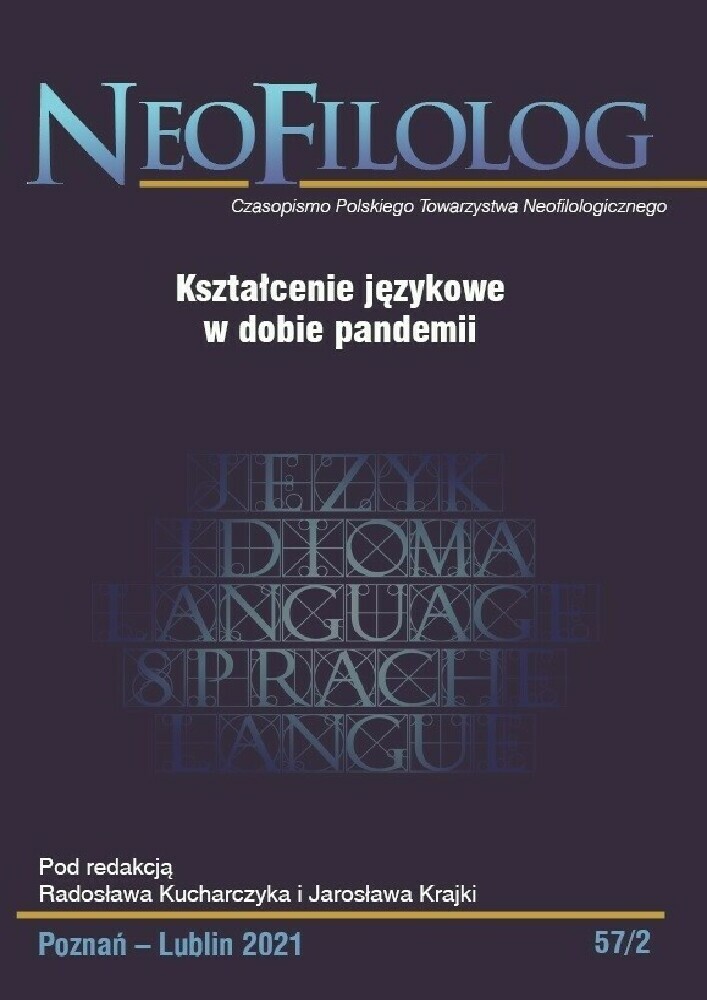Abstract
Affective factors are one of the two types of individual factors that influence success in the process of foreign language learning. They consist of personality traits, as well as positive and negative emotions. This emotional dichotomy is also reflected in the popular concept of comfort zone. The aim of this paper is to define the comfort zone in the context of distance learning language classes and to check if and how it is possible to implement this model in research in the field of glottodidactics. The results of empirical research on the perception and experience of the comfort zone during synchronous distance learning classes by philology students are presented and analyzed in order to draw conclusions on the impact of positive and negative emotions on the process and effects of the language distance learning.
Literaturhinweise
Biedroń A. (2019), Czynniki afektywne w teorii i badaniach nad zdolnościami językowymi, „Neofilolog”, 52 (1), s. 29–41.
Brown M. (2008), Comfort Zone: Model or metaphor? „Journal of Outdoor and Environmental Education”, 12, s. 3–12.
Bueno K. (2006), Stepping Out of the Comfort Zone: Profiles of Third-Year Spanish Students’ Attempts to Develop Their Speaking Skills. “Foreign Language Annals”, 39 (3), s. 451–470.
Donesch-Jeżo E. (2020), Psychologiczne aspekty nauczania języków obcych, (w:) Ostrowski T.M. (red.), Blaski i cienie życia - perspektywa psychologiczna. Kraków: Oficyna Wydawnicza AFM, s. 95–130.
Długosz, P. (2020), Raport z II etapu badań studentów UP. Opinia na temat zdalnego nauczania i samopoczucia psychicznego. Online: https://rep.up.krakow.pl/xmlui/bitstream/handle/11716/7488/Raport%20Studenci%20UP%20II%20etap.pdf?sequence=1&isAllowed=y [DW 01.10.2021].
Estrellas A. (1996), The eustress paradigm: A strategy for decreasing stress in wilderness adventure programming, (w:) Warren K. (red.), Women’s voices in experiential education. Dubuque, IA: Kendall Hunt, s. 32–44.
Felix U. (2004). Performing beyond the comfort zone: Giving a voice to online communication, (w:) Atkinson R., McBeath C., Jonas-Dwyer D., Phillips R. (red.), Beyond the comfort zone: Proceedings of the 21st ASCILITE Conference. Perth, s. 284–293.
Festinger L. (1957), A theory of cognitive dissonance. Stanford, CA: Stanford University Press.
Gajda E., Biskupek-Wanot A. (2020), Stres i jego skutki, (w:) Biskupek-Wanot A., Wanot B., Kasprowska-Nowak K. (red.), Aktywność fizyczna i problematyka stresu. Częstochowa: Wydawnictwo Naukowe Uniwersytetu Humanistyczno-Przyrodniczego im. Jana Długosza w Częstochowie, s. 84–93.
Heród M., Pawłowska B., Strzała-Osuch, K. (2021), Analiza i ocena nauczania zdalnego w okresie pandemii w opinii studentów Powiślańskiej Szkoły Wyższej. Online: https://psw.kwidzyn.edu.pl/images/badania/Analiza%20i%20ocena%20nauczania%20zdalnego%20w%20okresie%20pandemii%20w%20opinii%20studentów%20Powiślańskiej%20Szkoły%20Wyższej%20w%20Kwidzynie_MH_BP_KSO%20OST%281%29.pdf [DW 01.10.2021].
Jankowiak A. (2020), Strefa komfortu na zajęciach z języka obcego – badanie pilotażowe. „Niderlandystyka Interdyscyplinarnie”, 5 (1), s. 41–47.
Kaczmarska A., Curyło-Sikora P. (2016), Problematyka stresu – przegląd koncepcji. „Hygeia Public Health”, 51 (4), s. 317–321.
Leberman S., Martin A. (2003), Does pushing comfort zones produce peak learning experiences? „Australian Journal of Outdoor Education”, 7 (1), s. 10–19.
Li A. (2020), Escaping the comfort zone. The first language ‘bubble’, (w:) Stanley P. (red.), Critical Autoethnography and Intercultural Learning. Emerging Voices. Londyn: Routledge, s. 65–75.
Lubina E. (2005), Rola emocji w procesie kształcenia na odległość. “e-mentor”, nr 3 (10). Online: http://www.e-mentor.edu.pl/artykul/index/numer/10/id/161 [DW 28.04.2021].
Lung-Lung H. (2017), Out of comfort zone - learning Chinese in chaos, (w:) Pixel (red.), Conference proceedings. ICT for language learning. 10th Edition. Padova: Webster Srl, s. 196–204.
Meger Z. (2008), Czynniki afektywne w zdalnej edukacji. „e-mentor”, 3 (25). Online: http://www.e-mentor.edu.pl/artykul/index/numer/25/id/552 [DW 28.04.2021].
Ogińska-Bulik N. (2009), Czy doświadczanie stresu może służyć zdrowiu? “Polskie Forum Psychologiczne”, 14 (1), s. 33–45.
Oxford R. (2003), Language learning styles and strategies: an overview. Online: https://web.ntpu.edu.tw/~language/workshop/read2.pdf [DW 28.04.2021].
Palamer-Kabacińska E. (2020), Pedagogika przygody – uczenie się bycia razem, uczenie się wspólnego działania. “Kultura i Edukacja”, 1 (127), s. 69–90.
Piaget J. (1977), The development of thought. New York: Viking Press.
Piaget J. (1980), Adaptation and intelligence. Chicago: University of Chicago Press.
Séror J., Weinberg A. (2013), Personal insights on a postsecondary immersion experience: Learning to step out of the comfort zone. “Cahiers de L’ILOB”, 6, s. 123–140.
Wagner-Tomaszewska (2020), Diagnoza i plan pracy z rodziną dysfunkcyjną. Materiał uzupełniający do szkolenia online. Online: https://mcps.com.pl/wp-content/uploads/2020/10/odnosnik3a.pdf [DW 28.04.2021].
https://nowewyrazy.uw.edu.pl [DW 28.04.2021]
https://sjp.pwn.pl [DW 28.04.2021]
Lizenz
Copyright (c) 2021 Agnieszka Jankowiak

Dieses Werk steht unter der Lizenz Creative Commons Namensnennung - Keine Bearbeitungen 4.0 International.
Autoren:
Die Autoren der zur Veröffentlichung in der Zeitschrift Neofilolog angenommenen Texte sind verpflichtet, den Vertrag über die Erteilung einer kostenlosen Lizenz für die Werke mit der Verpflichtung zur Erteilung einer Sublizenz CC auszufüllen, zu unterzeichnen und an die Adresse der Redaktion zurückzusenden.
Gemäß Vertrag erteilen die Autoren auf die in der Zeitschrift Neofilolog veröffentlichten Texte der Adam-Mickiewicz-Universität in Poznań eine nicht exklusive und kostenlose Lizenz und erlauben die Verwendung der Sublizenz Creative Commons Attribution-NoDerivatives 4.0 International (CC BY-ND 4.0).
Die Autoren behalten das Recht zur weiteren freien Verfügung über das Werk.
Benutzer:
Interessierte Onlinebenutzer dürfen die seit 2017 veröffentlichten Werke unter folgenden Bedingungen nutzen:
- Anerkennung der Urheberschaft - die Verpflichtung, zusammen mit dem verbreiteten Werk Informationen über die Urheberschaft, den Titel, die Quelle (Links zum Originalwerk, DOI) und die Lizenz selbst bereitzustellen;
- ohne Schaffung abgeleiteter Werke - das Werk muss in seiner ursprünglichen Form erhalten bleiben, ohne Zustimmung des Autors dürfen keine Studien, beispielsweise Übersetzungen, verbreitet werden.
Die Urheberrechte aller veröffentlichen Texte sind vorbehalten.
Sonstige:
Die Adam-Mickiewicz-Universität in Poznań behält das Recht auf die Zeitschrift als Gesamtheit (Layout, Grafik, Titel, Umschlagsprojekt, Logo usw.).

